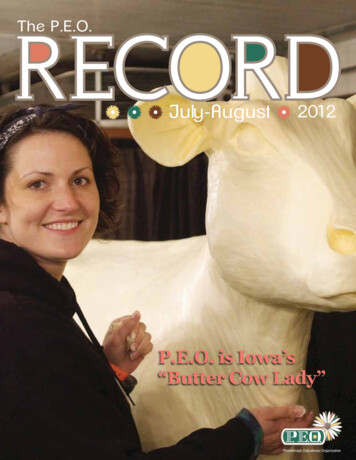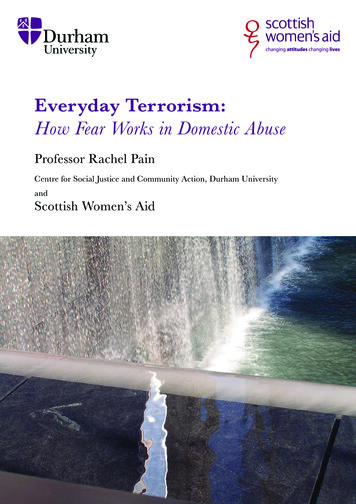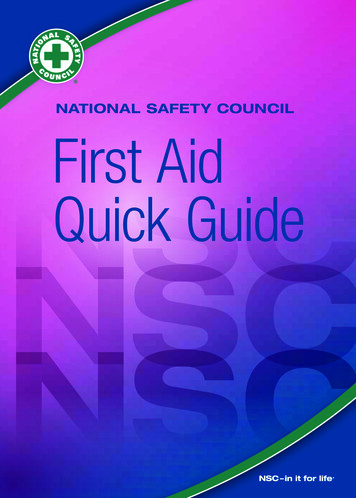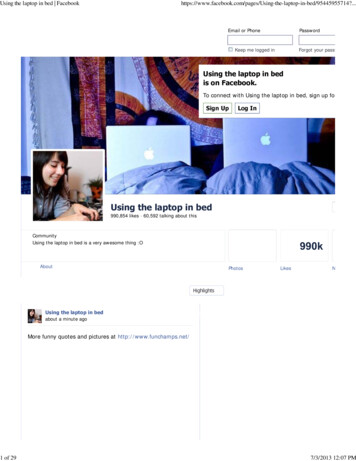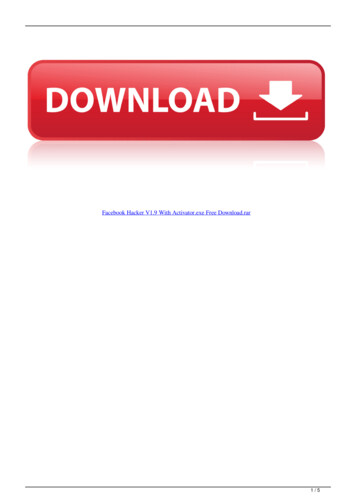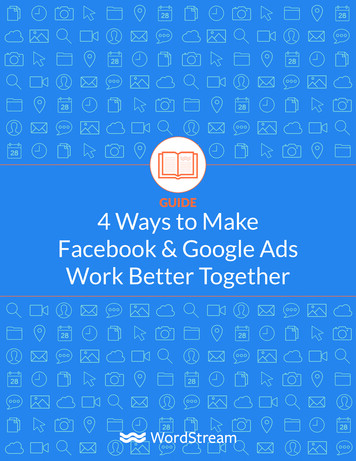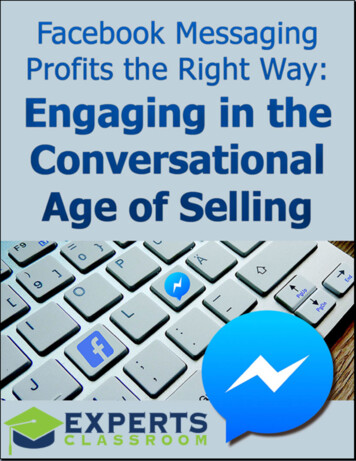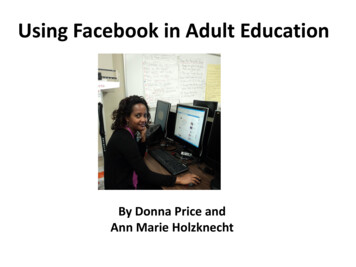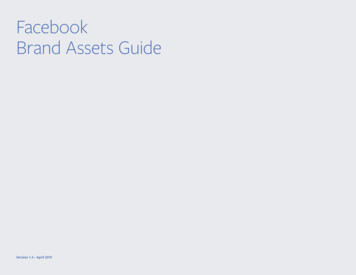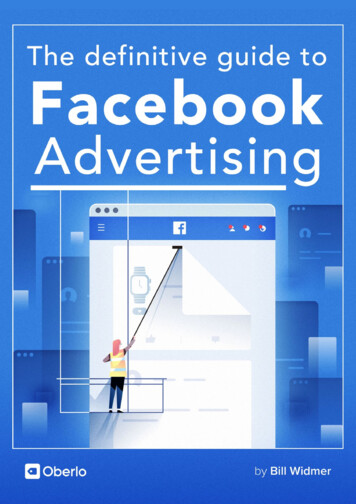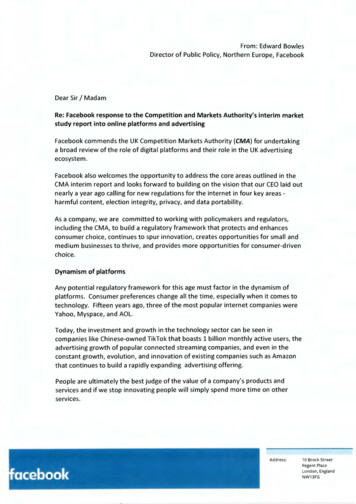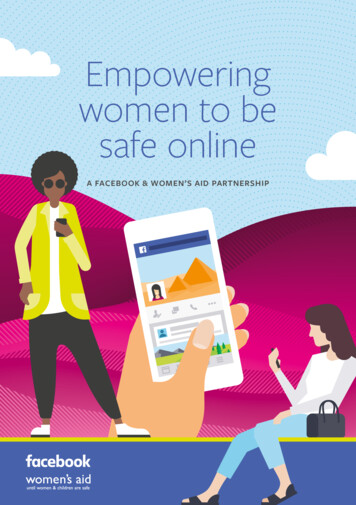
Transcription
Empoweringwomen to besafe onlineA FACEBOOK & WOMEN’S AID PARTNERSHIP1
Empoweringwomen to besafe onlineA FACEBOOK & WOMEN’S AID PARTNERSHIPCONTENTS1]] Introduction2]] What is online abuse?4]] A real woman’s story5]] Risks6]] Become a Facebook safety expert7]] Help from Facebook11]] Support from Women’s Aid12]] Safety tips - frequently asked questions13
Welcome to ouronline safety guideWomen’s Aid says The online world should be open andsafe for everyone to use. Sadly, whilstit offers us incredible opportunities, italso provides perpetrators of domesticabuse many ways to control, threatenand intimidate their victims.This guide will empower you to bein control of your own safety onFacebook so you can stay connected tothe people and causes you care about.Remember, if you or a friend areexperiencing domestic abuse you canfind support 24 hours a day, 7 days aweek, from the Freephone NationalDomestic Violence Helpline (run inpartnership between Women’s Aidand Refuge) on 0808 2000 247 or viahelpline@womensaid.org.ukFreephone National Domestic Violence Helpline0808 2000 247helpline@womensaid.org.uk2
To keep people safe, we work with experts from all over the worldto create strong policies, called our Community Standards, toolssuch as reporting and blocking designed to empower people tostay safe, helpful resources such as this guide, and finally we havehuge engineering teams – working 24/7 around the world.We also work closely with experts in safety who help to informour products, policies, community education programmes andsafety guides.Regarding crimes such as domestic abuse thatdisproportionately impact women, we work withwomen’s safety experts, academics and charitiesincluding Women’s Aid.Together we will continue to work towardsa safer online world for women.We hope you find this guide useful.Facebook says 3
What isonline abuse?DOMESTIC ABUSEDomestic abuse is any incident, or pattern of incidents,of controlling, coercive, threatening, degrading andviolent behaviour, including sexual violence.In most cases domestic abuse is perpetrated by a partner or ex-partner - but itcan also be from a family member or carer. In the vast majority of cases domesticabuse is experienced by women and perpetrated by men. Domestic abuse includesemotional, physical, sexual and financial forms of abuse, as well as stalking,harassment and coercive control. Any woman, regardless of her age, race, religion,sexuality or disability, can be a victim.ONLINE ABUSEMany women now often experienceonline forms of domestic abuse.Perpetrators do not only need to live with or find a victim ‘in the real world’, butcan abuse, harass and stalk them online too. For example, abusive partners andex-partners frequently use social media to humiliate and threaten their victims,hack into their emails and accounts, and even use spyware to track them down. Weknow that perpetrators of domestic abuse often use Facebook to abuse partnersor ex-partners, monitor their movements, and share intimate photos or videos ofthem without their consent. This abusive behaviour is unacceptable, and againstFacebook’s rules (Community Standards).4
A realwoman’s storyHow a perpetrator has made fake social mediaaccounts to harass his victim, and her family:“During the six years they were together he bullied her verbally andpsychologically, controlling her every move. He denied her any money,even for deodorant or clothes and food. He would push, shove, andstrangle her at his most violent. After escaping to a refuge she moved intoa house of her own, but he continually harassed her. He sent constantmessages through Facebook, watched to see where she was going andwould follow her. He used Facebook, among other things, to track downher new addresses when she moved so he could harass her at her house.”But there are ways to stop this.By understanding the risks andtools you need to stay safeonline you can becomea Facebook safety expert.5
RisksSocial media platforms provide perpetrators with plentyof opportunities to control and instill fear in their victims.They can monitor their victims, share their intimate photosor videos without consent, and send abuse directly too.People are particularly at risk whentheir social media account is hacked.But there are ways youcan reduce these risks.A partner or ex-partner may know, or caneasily guess, your username and password.Once they have accessed your account theycan contact or block your friends, change yoursettings, and access and make copies of yourphotos and videos before you even know youhave been hacked.We know that survivors are already expertsat managing their own risk and safety. Butthere are specific steps you can take to protectyourself online. This guide has a lot of helpfultips - from how to report something that isabusive, to stopping an intimate, private orsexual image from being shared online - tohelp you become a Facebook safety expert.6
Become a Facebooksafety expertHere are some easy tips to keepyou and your information safe.PROTECT YOUR ACCOUNTKeep your password safeDon’t use your Facebook password anywhere else online, and never share yourpassword. You should be the only one who knows it. Avoid using personallyidentifiable information that can be easily discovered such as your name, phonenumber, birthdate, mailing address, etc. Your password should be difficult to guess.You can find the following tools in your Settings, in the Security and Loginsection, to make your profile more secure:]] Get alerts about unrecognised logins if your accountis being logged into from a new device]] Use two-factor authentication as an extra layer of security, by entering acode, as well as your password, on new devices. There are 3 different waysyou can retrieve your special security code:1. We’ll send you a text message (SMS - note: charges may apply)with a login code each time you need one.2. You can use Code Generator if you have theFacebook app on your smartphone or tablet.3. You can get 10 codes to print, write down,or save for when you need them.7
PROTECT YOUR INFORMATIONManage your privacyThe following tools can help you further customise your privacy:]] Take the Privacy Checkup to make sure you are only sharinginformation and posts with the people you want.]] On your computer, you can organise groups of friends using lists.This will help control who can see what you share on Facebook.]] Visit the Privacy section under Settings to see who can seeyour posts, who can contact you, and who can look you up.]] Review activity on your Facebook profile by viewing your Activity Log,or if you’re on a computer, see what others see when they visit your profile,by selecting View As, to the right side of your cover photo.RESPONDING TO ABUSIVE CONTENTFacebook’s Community Standards aim to find the right balance between givingpeople a place to express themselves and promoting a welcoming and safecommunity for everyone. Here’s what to do if you notice abusive behaviour fromanyone on your profile or Page:Report contentThe best way to report abusive content or spam on Facebook is by using theReport link that appears near the content itself. We will review the report and takeappropriate action.Facebook is always working to optimise our reporting flows, for this reason, theyare often updated. Please check facebook.com/report for the most up to dateinformation on how to report comments or messages.8
Document abuseIf you plan to report harassment to the police, take screen shots of anyunwanted attention before blocking the harasser. After blocking someone,their prior engagement with you will no longer be visible.Block harassersBlocking someone will prevent them from friending you or startingconversations with you. They will not be able to see things you poston your Timeline. To block someone:]] Click on the “.” to the right of their name on their Facebookprofile, scroll to the bottom of the menu, and select “Block”.]] Or, go to your Settings and click “Blocking”, enter the nameof the user you would like to block.]] Users will not be notified when you block them.Contact the policeContact the police if you feel threatened. Remember that, if you are stillliving together or in physical contact, an abusive partner or ex-partnermay not only be a threat online - but offline too.9
SAFETY CONCERNSIn addition to your own personal safety, sometimes it can be difficult to know whatto do when a post, news story, or photo provokes emotional sharing or concerningcomments from your followers.Here’s how to notify Facebook if you’re concerned someone may be a danger tothemselves, and some additional resources that might be helpful:Report intimate images shared without your consentFacebook has tools to help people when intimate images are shared on theplatform without their permission. When this content, often referred to as“revenge porn,” is reported to us, we can now prevent it from being shared onFacebook, Messenger and Instagram.You can find more resources on how to report these images atfb.me/not-without-my-consentReport self-harmIf you know or believe someone is in immediate physical danger, please contactyour local police force or a suicide support service immediately. Facebook canprovide resources to a person engaging in self-harm, suicidal thoughts, and eatingdisordered behaviour through the reporting tool. For instructions on how to reporta comment or post that may indicate self-harm, go to facebook.com/report. Notethat this option is sometimes found in an “other” category.You can find a list of self-harm and suicide prevention helplines and resources idesupportYou can find eating disorder support helplines and resources here:fb.me/EatingDisorderSupport10
Help fromFacebookFacebook has more helpand resources including:HELP CENTRE:Here you can find additional information andresources - such as on harassment or nonconsensual sharing of intimate images.facebook.com/helpSAFETY CENTRE:Helpful tips and tools about staying safeonline, and what to do when you seethreatening or abusive content.facebook.com/safetySAFETY PAGE:You will find updates and developmentson online safety, both by Facebook andour partners around the world.facebook.com/fbsafetyCHECK UPS:Facebook have created tools, such as a ‘PrivacyCheck-up’ and the ‘View As’ tool, so you canunderstand your privacy settings and controlyour safety as easily as possible.11
Support fromWomen’s AidWomen’s Aid is the national charity for women andchildren working to end domestic abuse. If you ora friend need help we are here to listen.]] You can call the National Domestic Violence Helpline(run in partnership with Women’s Aid and Refuge) on0808 2000 247 or contact via helpline@womensaid.org.uk]] Visit the Survivors’ Forum - a safe, anonymous space for women (over 18)who have been affected by domestic abuse to share their experiences andsupport one another: survivorsforum.womensaid.org.uk]] Find your local domestic abuse ] Read the Survivors’ Handbook for practical help and support:womensaid.org.uk/the-survivors-handbook]] Find out if you are in an abusive relationshipby answering these simple questions -anabusive-relationship/]] Find out how you can help if you are worried about someone else ed-about-someone-else/12
Safety tipsFREQUENTLY ASKED QUESTIONSCan I get an alert when someone trieslogging into my account?Yes. When you turn on login alerts, Facebook will send you anotification when anyone tries to log into your account from anew computer, phone or tablet.fb.me/LoginNotificationsCan I limit who sees what I post?Yes. When you share status updates, photos and other things youpost, you can select the audience. You can even limit the audiencewho see your content. Tap the arrow where it says ‘to’, and selectthe people you want to share with.fb.me/AudienceSelectorIf I don’t want someone to contact me, can I block them?Yes. You can block someone for any reason at all. They will nolonger be able to see things you post on your profile, tag you, starta conversation with you or add you as a friend. Facebook does notnotify the person that you have blocked them.fb.me/BlockingCan I report abusive things on Facebook?Yes. Report something you think is abusive or inappropriatefor Facebook by using the report link next to the photo, postor comment. We remove reported content that violates ourCommunity Standards.fb.me/Reporting13
Can I do something if someone shares an intimate photoof me without my permission, or threatens to?Yes. Please report it to us. Non-consensual sharing of intimate images is illegaland violates our Community Standards - as do threats to share those images. Weremove photos or videos depicting incidents of sexual violence, or intimate imagesthat are shared without your consent, and we will remove threats to do so too. Ournew technology ensures that the intimate images or films that you have reportedcannot be shared on Facebook again. Remember to always record evidence bytaking a screenshot, and report the crime to the police too.fb.me/NCIIHow do I check my privacy settings?To review and improve your security, select ‘more’, ‘settings’,‘account settings’ and then select ‘security.’fb.me/PrivacyCheckupWhat do I do if he is friends with my children on Facebook?Abusive partners or ex-partners often try to keep in contact with children throughsocial networks like Facebook in order to continue abuse. If contact with your childvia social networks can be avoided, it should be. If your child insists on social mediacontact, then they should create a special account, with the highest privacy andsecurity settings, in which they are only friends with their father – no-one else. Yourchild should block you, your friends and family as friends on this account. Finally,you should give them information about what they should and shouldn’t share onthis profile, and inform them that they should never open or download files fromthe father because it could be spyware.14
I’m scared that he will hurt me if I change my passwordYou are the expert in managing your own risk and safety. If you feel that takingany of these actions will put you at further risk – for example if your partnerwould retaliate if you change your password – it is essential that you always putyour physical safety first. Contact the police if you are in danger, and get in touchwith the National Domestic Violence Helpline for advice and support with safetyplanning.To learn more about protecting your privacy visitfacebook.com/about/basics15
facebook.com/safetywomensaid.org.uk
hack into their emails and accounts, and even use spyware to track them down. We know that perpetrators of domestic abuse often use Facebook to abuse partners or ex-partners, monitor their movements, and share intimate photos or videos of them without their con
